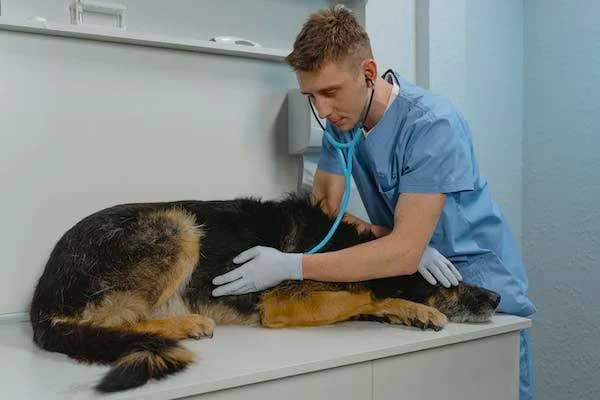19 Common German Shepherd Health Problems: How to Identify and Treat
If you’re the proud pet parent of a German Shepherd, then you know that these loyal and brave dogs are excellent companions. But as with any breed, they can be prone to specific health problems.
From hip dysplasia to bladder stones, there are several health issues your GSD could face during their lifetime.
In this blog post, we’ll take an in-depth look at some of the most common German Shepherd health problems so you can help keep your furry friend happy and healthy for years to come!
Common German Shepherd Health Problems
German Shepherds have provided companionship and comfort for many years. But with any breed, specific health issues can affect them.
Most common health problems that German Shepherds may face.
Hip Dysplasia
Hip Dysplasia is the most common health issue in German Shepherds and other large breeds. This condition is usually genetic but can be worsened by obesity or overuse.
It occurs when the hip joint has not developed correctly, leading to pain and stiffness. Treatment typically involves surgery or medications to help reduce inflammation and pain.
Elbow Dysplasia
Elbow Dysplasia is another common health issue found in German Shepherds, though it is slightly less common than hip dysplasia.
This condition causes inflammation in the elbow joint, leading to pain, lameness, and arthritis if left untreated. Treatment includes medication and surgery if necessary.
Gastric Dilatation and Volvulus
Gastric Dilatation and Volvulus, also known as bloat or GDV, occurs when a dog’s stomach expands due to gas buildup, which can twist on itself, causing a blockage.
This emergency requires immediate medical attention as it can be fatal if not treated promptly. Prevention strategies include:
- Feeding smaller meals throughout the day instead of one large meal.
- Avoiding high-fat foods.
- Exercising moderately after eating meals or snacks.
Degenerative Myelopathy (DM)
Degenerative Myelopathy (DM) is an inherited neurological disorder that affects German Shepherds’ spinal cord, resulting in progressive paralysis in their hind legs.
While there is no cure for DM, physical therapy and acupuncture may help slow its progression or reduce symptoms, such as muscle spasms or incontinence.
In addition, supplements such as omega-3 fatty acids reduce inflammation associated with this disease which may also help improve the quality of life for affected dogs.
Eye problems
Eye problems are one of the most common issues in German Shepherds. Common issues include cataracts, progressive retinal atrophy (PRA), corneal dystrophy, and entropion.
All of these conditions can lead to vision loss if left untreated. Many eye problems are genetic, so getting a pup from a reputable breeder who screens their dogs for potential eye problems is essential.
Epilepsy
Epilepsy is another issue that commonly affects German Shepherds. It is a neurological disorder that causes seizures and can be challenging to diagnose since no single test can confirm it.
The best way to tell if your German Shepherd has epilepsy is to monitor them regularly with a vet and look for signs or symptoms such as convulsions or periods of confusion or disorientation.
Hemophilia
Hemophilia is an inherited bleeding disorder that affects some German Shepherds. Symptoms may include excessive bleeding after surgery, injury, or trauma and difficulty forming clots when injured.
If your pup has been diagnosed with hemophilia, regular blood transfusions or medications may be needed to help prevent bleeding episodes.
Diabetes
Diabetes is also relatively common in German Shepherds and can cause excessive thirst, urination, and weight loss despite increased food intake.
Dogs with diabetes need regular insulin shots and careful monitoring of their diet and exercise regime to keep their diabetes under control.
Cataracts
It’s a common eye disorder in German Shepherds. In its early stages, cataracts cause slight cloudiness or yellowing of the pupil.
As the condition progresses, vision can be significantly impaired. Fortunately, if caught early enough, cataracts can often be treated with surgery.
Degenerative Disc Disease (DDD)
This is an age-related condition that affects German Shepherds as they get older.
It occurs when the discs between each vertebra start to break down, resulting in pain and inflammation around the spine.
Although there is no cure for DDD, physical therapy and anti-inflammatory medications can help to reduce the symptoms.
Panosteitis
Also known as “growing pains,” panosteitis is a painful condition caused by inflammation of the bones in young GSDs who are still growing—usually between four months and two years old.
The good news is that this condition usually resolves independently after several weeks or months; however, pain relief medications may be necessary.
Allergies
German Shepherds are prone to allergies due to their thick coats and sensitive skin. When allergens come into contact with their skin or fur, it can lead to itching and irritation, which can be difficult for them to manage independently.
Allergy testing can help determine which allergens affect your pup so that you can reduce their exposure and manage symptoms more effectively with medication or dietary changes if necessary.
Pancreatitis
Pancreatitis is when the pancreas becomes inflamed due to a buildup of toxins in the body. This condition can cause vomiting, diarrhea, lethargy, and loss of appetite.
It is essential to take your dog to the vet if you suspect it may have pancreatitis so that it can be appropriately diagnosed and treated.
Thyroid Issues
German Shepherds may suffer from thyroid issues such as hypothyroidism or hyperthyroidism. Hypothyroidism happens when the thyroid gland produces insufficient thyroid hormone, resulting in symptoms such as weight gain or hair loss.
Hyperthyroidism occurs when the gland produces too much thyroid hormone, resulting in symptoms such as increased activity or restlessness.
If your German Shepherd has any of these symptoms, it is best to take them to be checked out by their veterinarian as soon as possible.
Bladder Stones
Bladder stones are prevalent in German Shepherds and can result from a buildup of minerals in the bladder or urinary tract. Symptoms include bloody urine, difficulty urinating, pain, and frequent urination.
Bladder stones can be painful for your pup and should be treated immediately by a veterinarian if suspected.
Urinary Tract Infections (UTI)
Urinary Tract Infections (UTI) Another common issue for German Shepherds is urinary tract infections are caused by bacteria entering the urinary tract leading to pain during urination or increased urination frequency.
Left untreated, these infections can lead to severe complications like bladder stones or kidney disease in dogs. To help prevent UTIs in your German Shepherd, ensure they get plenty of fresh water daily and monitor them for signs of infection.
Nose Infections
Nose infections are common in dogs due to their proximity to other animals and the elements outdoors. Signs of a nose infection include sneezing and nasal discharge or a strong odor from the nose area.
If you suspect your dog has a nose infection, you must visit your veterinarian as soon as possible.
Dental Health Problems
Just like humans, German Shepherds can suffer from poor dental health if not properly cared for. Bad breath often indicates bacterial plaque forming on their teeth, which can lead to periodontal disease if not addressed quickly enough.
To avoid this issue, brush your dog’s teeth regularly and feed them high-quality kibble that helps keep their mouth free from plaque buildup.
Cancer
Sadly, cancer is one of the leading causes of death in German Shepherds due to their large size and life expectancy (average lifespan is 10-12 years).
Common cancers seen in this breed include lymphoma, hemangiosarcoma (cancer of the blood vessels), mast cell tumors (cancerous cells found in connective tissue), osteosarcoma (bone cancer), skin tumors/cancers such as melanomas or squamous cell carcinoma (skin cancer), and more depending on several factors such as age, health status, environmental exposure.
The best way to detect early signs of cancer is through regular vet visits where they perform routine exams, blood work/x-rays/ultrasounds, etc.
What to Watch Out for – Signs and Symptoms of Possible Health Concerns
German Shepherds are loyal and intelligent dogs, but like any other animal, they can experience health problems.
It’s essential to watch for signs and symptoms indicating potential health issues so your German Shepherd can get the proper treatment as soon as possible.
Common warning signs in German Shepherds include difficulty breathing, discharge from the eyes or nose, excessive scratching or chewing at skin, vomiting, diarrhea, limping or stiffness when walking, and changes in appetite and behavior patterns.
If you see any signs and symptoms in your German Shepherd, it is best to take them to the vet immediately for diagnosis and treatment.
The Importance of Regular Check-Ups with Your Veterinarian
German Shepherds are incredibly loyal, intelligent, and active dog breeds.
They need regular exercise and mental stimulation to stay healthy and happy, but they also require regular veterinary check-ups to maintain their health.
Regular vet visits ensure potential health problems are detected early on and can be treated quickly and effectively.
These check-ups also allow vaccinations to protect your German Shepherd against common diseases like distemper or parvovirus.
Finally, regular vet visits offer you and your veterinarian a chance to discuss nutrition needs and behavior issues such as aggression or anxiety.
By scheduling routine check-ups with your veterinarian, you’ll take the necessary steps to keep your German Shepherd safe, healthy, and happy for many years!
Tips on How to Keep Your German Shepherd Healthy, Including Diet and Exercise
German Shepherds are an intelligent and active breed of dog that can make great companions. However, taking care of their health is essential by providing them with a proper diet and plenty of exercises.
Providing your German Shepherd with a balanced diet is essential. This will ensure they get all the nutrients necessary for proper health and development.
Feeding them high-quality kibble or wet food is best as it has been specially formulated to meet their nutritional needs. It would help to supplement your diet with plenty of vegetables, fruits, and other healthy treats.
It is crucial to make sure they get plenty of exercises. German Shepherds are a naturally active breed that needs lots of physical activity.
Taking your pup for walks runs, or hikes will help them stay in shape and reduce the risk of obesity-related illnesses. Training exercises like agility, obedience, and retrieving will help strengthen their bond with you.
German Shepherds are brilliant dogs who need activities to keep their minds busy.
Remember to give your pup plenty of mental stimulation. Interactive toys like puzzle games and treat dispensers are great ways to challenge them while providing some fun at the same time.
You can keep your German Shepherd healthy and happy for many years with the proper diet and exercise plan.
So ensure they have the best nutrition, physical activity, and mental stimulation possible! With a little effort, your pup will thank you for it!
The Benefits of Spaying and Neutering German Shepherds
Spaying and neutering German Shepherds benefits the dog and the owner.
It helps control the pet population and improves your pet’s overall health.
First, spaying or neutering your German Shepherd can prevent severe health conditions in later life.
Spay or neuter surgeries remove the dog’s reproductive organs, reducing its risk of developing cancers and other diseases. Plus, they will be more likely to roam away searching for a mate!
Second, spaying or neutering can help your German Shepherd keep its calm demeanor.
Unneutered male dogs are prone to aggression, marking their territory, and other troublesome behaviors. Spaying or neutering helps eliminate many of these undesirable traits.
Finally, by spaying or neutering your German Shepherd, you are helping to reduce the number of homeless animals in pounds and shelters.
If everyone took responsibility for controlling the unwanted pet population, fewer dogs would need homes.
ISpaying and neutering your German Shepherd is an important decision that can benefit both the pet and the owner long-term.
It’s a win-win situation! So go ahead – make sure your furry friend is cared for and help reduce the number of homeless animals in our communities.
How Pet Insurance Can Help in Case of a Medical Emergency
Pet insurance can be a lifesaver in the event of a medical emergency.
Pet insurance covers the costs associated with veterinary visits, treatments, surgeries, and medications compared to human health insurance.
By investing in pet insurance, you are providing your beloved animal companion with the best possible protection from unexpected medical costs that may arise in an emergency.
So if you’re looking for peace of mind when caring for your furry friend, pet insurance is worth considering! After all, nothing beats the peace of mind – not even a basket full of treats!
Conclusion
Awareness of some of German Shepherds’ most common health issues is critical for keeping them healthy for extended periods and ensuring that any health issues are caught early enough before they become too severe!
It’s also essential to give your dog plenty of exercise and mental stimulation by providing plenty of toys/treats/walks, etc., while ensuring they have access to fresh water throughout the day!











